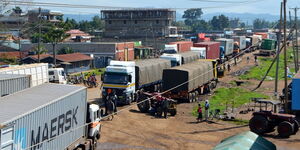The Central Bank of Kenya projected a drop in the inflation rate by the end of August or September 2023, offering the Kenya Kwanza a boost in its efforts to reduce the high cost of living.
CBK Governor, Kamau Thugge, on Tuesday, June 27, expressed optimism that inflation would drop after a slight increase in July.
He attributed the rise in prices of essential commodities to the implementation of the 16 per cent Value Added Tax (VAT) on fuel products in the Finance Act 2023.
With President William Ruto's administration unveiling measures to revive the economy, the Finance Act, Thugge noted, the policy changes would cushion Kenyans from soaring food prices.
Some of the measures included lowering the Import Declaration Fee (IDF) and the Railway Development Levy (RDL).
"On the VAT issue, there are also offsetting factors such as the import declaration fee, which has been reduced from 3.5 to 2.5 per cent. The Railway Development Levy (RDL) is from two to 1.5 per cent.
"This will mitigate any factors that may arise from VAT on fuel," he explained, with the opposition riding on the doubling of the tax to convince its followers to oppose what it argued was a punitive measure.
To further promote economic stability, the government would also alleviate pressure on the price of essential goods by ensuring that the inflation rate is maintained at 7.5 per cent.
"We do expect some increase in July 2027, but given the actions that we are now taking we expect that by August or September, the overall inflation will drop to 7.5 - firmly within our target of 2.5 per cent to 7.5 per cent," Thugge expressed.
Experts project fuel prices will increase by Ksh12 per litre in the Energy and Petroleum Regulatory Authority (EPRA) review scheduled for July 14 in line with the 16 per cent VAT adoption.
Based on EPRA's prices released on June 14, super petrol may increase to an average of Ksh194 from the current Ksh182.04.
Diesel, on the other hand, may rise to Ksh177.94 from Ksh167.28.
To cushion themselves from incurring losses, matatu operators were expected to increase fare prices which may culminate in traders hiking the cost of basic food commodities.
April - May Inflation
In April 2023, inflation increased by 0.1 per cent to 8.0 per cent, occasioned by increased prices of food and non-food items such as fuel.
"Food inflation increased to 10.2 per cent in May from 10.1 per cent in April 2023, largely due to a sharp rise in sugar prices. Prices of some key food items, particularly vegetables, declined following improved supply attributed to the long rains and lower global food prices.
"Fuel inflation increased to 13.6 per cent in May from 13.2 per cent in April, mainly due to the removal of the fuel subsidy, and increases in electricity prices following an upward adjustment of tariffs in April," CBK stated.












